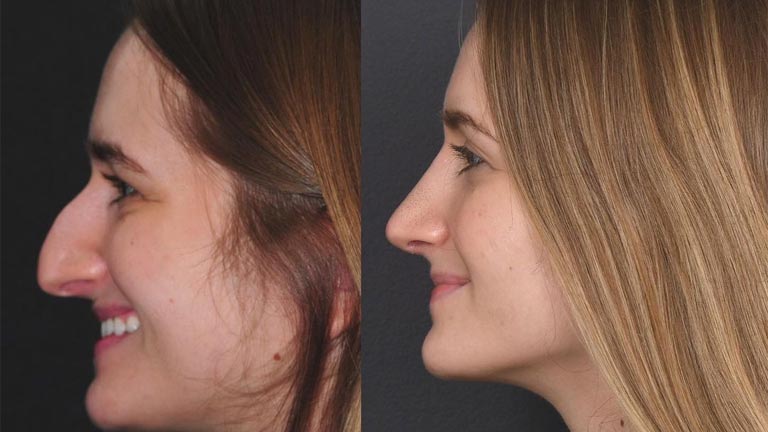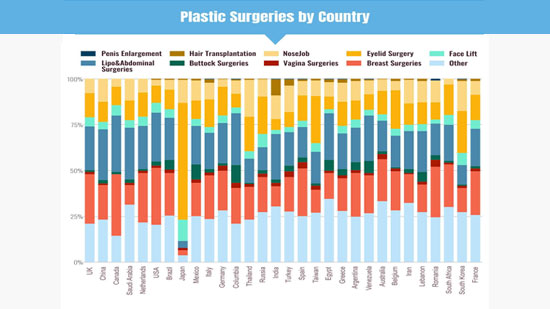
Many people are hesitant to have a cosmetic consultation for plastic surgery. It is understandable, as elective procedures differ from a medical emergency requiring immediate treatment. What are the most common plastic surgeries performed to enhance the appearance and boost self-confidence?
Liposuction
Liposuction is a cosmetic surgery that eliminates stubborn fat deposits from the body that do not respond to diet and exercise. It can change body composition and give the hips, thighs, buttocks, and tummy a minor appearance. As long as you keep your weight consistent, the effects of liposuction are long-lasting.
Before liposuction, you will receive sedation or general anesthesia. A surgeon will then insert a long metal instrument called a cannula under your skin. The cannula vacuums out the fatty tissue through tiny incisions. The removed fat cells can be discarded, injected back into the body to enhance features like the buttocks or face, or used as a source of stem cells for laboratory research.
Find a plastic surgeon who performs various facial and body operations. A surgeon with extensive experience in breast reconstruction, microsurgery, rhinoplasty, and abdominoplasty is a good choice. Also, check the doctor’s before and after pictures to see how he has helped patients with your concerns and body type.
Mid-Face Lift
A mid-face lift can restore youthfulness to the middle third of the face between the lower eyelid and upper corner of the mouth. It can also flatten lines and wrinkles, lift sagging cheek pads and give a look more structure and vigor.
This Bellevue plastic surgery procedure can turn back the clock on your facial appearance by ten years or more. The effects are long-lasting and can be maintained with regular touch-ups.
During a mid-face lift, an incision is hidden in the hairline through which fat and muscle are lifted to sit higher on the cheekbone. This repositioning smoothes smile lines and turns the corner of your lips upward.
A mid-face lift can be performed alone or as part of a complete facelift or neck lift. Anyone with mild to severe face aging or drooping may consider it. Patients with more advanced facial aging or sagging of the skin and jawline may need more extensive treatment, such as a complete facelift or a jowl lift.
Nose Job
You can have rhinoplasty surgery to alter the contour of your nose. It can be done for reconstructive reasons like fixing a broken nose or correcting breathing problems. You could also do it to enhance your appearance and your self-esteem.
The person who conducts this surgery could be a plastic surgeon, an oral and maxillofacial surgeon, or an otolaryngologist (an expert in the ears, nose, and throat). The surgeon separates the nasal skin and soft tissues from the nose framework, altering them for form and function, then suturing the incisions.
The surgeon may use a skin graft flap from the ear or rib to repair a partial nasal defect not sufficiently covered by the skin. Alternatively, they may utilize cartilage grafts from the ear (auricular) or the rib cage. Such grafts are usually longer than the rim of the defect to be repaired. Using a template created from the measurements of the nasal defect that needs to be fixed, the surgeon begins the paramedian forehead flap.
Eyelid Surgery
Eyelid surgery can treat puffy bags beneath the eyes and drooping upper eyelids by removing extra fat, strengthening muscles, and clipping loose skin. A lateral canthoplasty is also performed to enhance the outer corner of the lower eyelid (or lateral canthal). The result is brighter, more refreshed-looking eyes with more volume and width.
A blepharoplasty can also help improve your line of vision. Drooping upper eyelids and excess deposits of skin can obscure your peripheral view. Removing excess fat tissue and subtly lifting the eyebrow (or brow) in the upper eyelid will make your argument more expansive.
Before eyelid surgery, it’s important to tell your facial plastic surgeon about any medical history that might indicate you’re not a good candidate for the procedure. You should also inform your surgeon if you have thyroid problems, dry eyes, high blood pressure or diabetes, or have a detached retina. Also, it would be best to stop taking aspirin, ibuprofen (Advil, Motrin IB), naproxen sodium (Aleve, others), and other drugs that increase bleeding.




